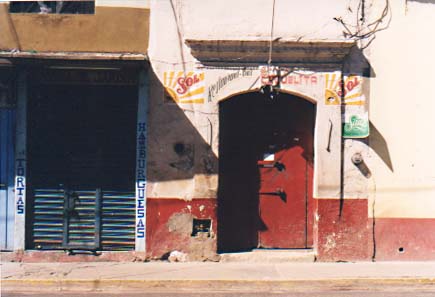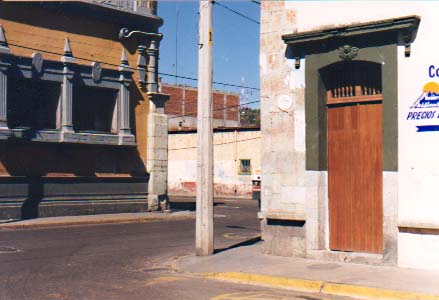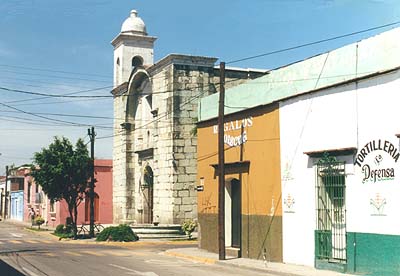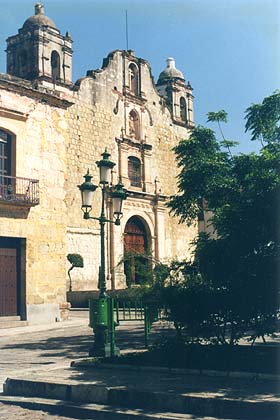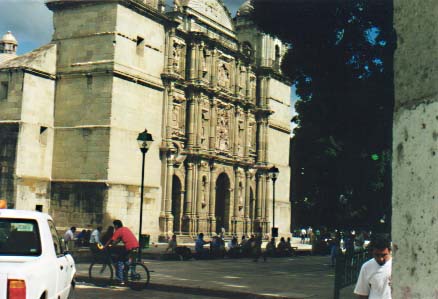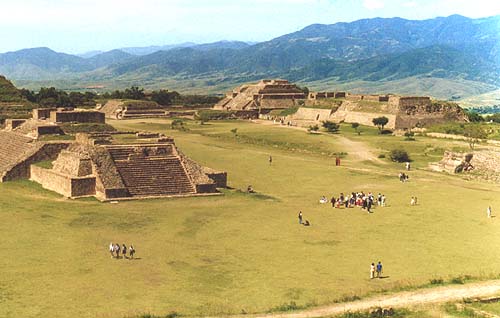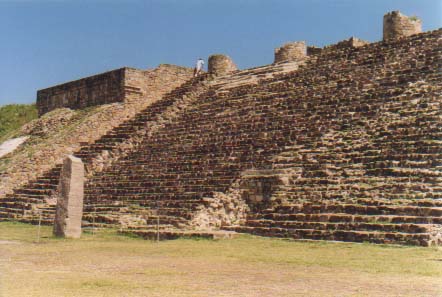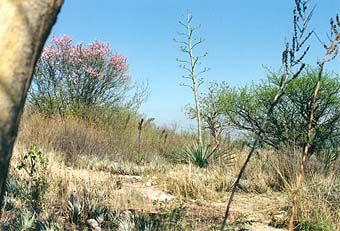|
Intro
|
I worked as an engineer in Chicago until the plant shut down. I wrote
software to support the manufacture of electronic components. This
type of work was destroying both my eyesight and my sanity, so,
when I found myself unemployed, I was
not in a hurry to look for another technical job.
I decided to sell my two apartment buildings
and move to some foreign country and teach English.
So I enrolled in the "Teaching English to Speakers of Other Languages"
(TESOL) program at Interamerican University in San Germán, Puerto
Rico. This program consists of 12 classes and normally takes two years.
I dropped-out after taking only three classes and
moved to Oaxaca, Mexico, to see if I could find a job teaching English.
A native speaker of English with a college degree does not need any special
training to secure a low-paying job teaching English in a foreign country.
And there is considerable demand for English instruction in Oaxaca,
because the locals want to learn English to get a job in the tourism industry.
I took Spanish classes at a school in Oaxaca which teaches Spanish to tourists
during the day and English to locals in the evening.
I could have taught there, but the pay was the equivalent of $250(US) per
month (not week, month) for teaching from 5pm til 9pm five days a week.
It did not seem
worth the effort. I would have spent most of the day preparing to teach
in the evening so it would have been essentially a full-time job.
In addition it would be illegal since I did not have a Work Permit.
(Very few of the Gringos teaching English in foreign countries are doing it legally.)
So I just bicycled around Oaxaca photographing lizards for a year.
(My lizard photos are on my Southalley website. Follow the link from the Home page.)
|
Hotel in Oaxaca
|
I stayed at a wonderful place in Oaxaca. It is an apartment house which operates
like a hotel. You can call and reserve an apartment, with stove and refrigerator and pots,
pans, dishes, by the day, week, or month.
I paid $300 (US) per month plus $50 for a TV with cable.
I am not going to put the name of the place here. I decided that I might
want to visit occasionally and if I create additional demand I might
have trouble finding an available apartment.
This hotel is usually filed to capacity during the winter months and
is nearly empty during
the summer months.
|
Visas
|
The laws and the way the laws are applied change over time.
So the following observations, from 1999-2000,
may be out-of-date.
Any gringo arriving by plane into Mexico can automatically receive a six-month tourist
visa.
A gringo can stay in Mexico indefinitely on a series of six-month tourist visas. It is
necessary to leave the country before the six-month period ends and to return and obtain
another six-month visa.
This might seem
like a corruption of the intent of the system, but apparently the logic is that anyone who can
afford a plane ticket is welcome to stay for six months.
An alternative is to get an FM-3 "Rentista" visa. FM-3 is a broad class of visas which
covers many situations. "Rentista" applies to people who can demonstrate that they have
enough resources to live without working.
There are people in Mexico who call themselves "paralegals" who can help
a gringo obtain a "Rentista" visa (even if the gringo does not seem
to meet the exact requirements of the law).
The visa must be renewed
each year. With such a visa, you are not required to leave and return every six months.
|
Zócalo
|
Most cities in Mexico have public parks called Zócalos in the city center.
Automobiles are not as common in Mexico as in the USA, so there is considerable
foot traffic
through the centers of cities. The Oaxaca Zócalo is especially robust due to
the presence of many tourists.
There are concerts almost every day and there are always vendors selling chewing gum,
food, hand-crafted artwork, etc.
|
|
|
Chores faced in normal apartments
|
Apartments in Oaxaca are very inexpensive.
One young woman who was teaching English at the language school where I took Spanish,
paid the equivalent of $50(US) per month for a small apartment.
I looked at a few apartments, but I did not find any in which I would have felt
comfortable.
The people in the inexpensive apartments
live in very close quarters with their neighbors.
The hotel in which I stayed caters to tourists. The staff takes care of all
the chores.
In a normal, non-tourist, apartment there are three little chores to
which you must attend.
These seem trivial, but taking the time to do them surely becomes a pain-in-the-butt.
First, Garbage: Living units are so close together in Oaxaca that there is
no space for garbage cans. So the garbage truck comes-by (once a week, I think)
ringing a bell, and people have to run out with their garbage to throw it
into the truck.
Number two, Water: The water that comes through the pipes is not purified
for human consumption. (In fact, Mexicans think that US cities are extravagant in purifying
all their water when so much of it is used to flush toilets and mop floors.)
Drinking water comes in 19-liter glass bottles. (about as large as a
person can carry.)
In the hotel, the staff makes sure that guests always have drinking water.
(You pay for the water. One 19-liter bottle costs about $1 US.)
If you
are in a non-tourist apartment, you have to go out to the street and flag down a water
truck. Small trucks selling bottles of water are constantly driving down the streets,
but I am sure that if you are looking for one, you will have to wait for hours.
And thirdly Propane. Just like water.
|
Bicycling
|
There is a shop which rents bicycles on JP Garcia, north of Mina, on the
east side of the street.
The price is 100 pesos for a full day. You leave your passport with them
to assure that you return.
The first three months I rented a bicycle about one day each week.
Then I figured-out that I could buy a
bicycle for about 2000 pesos and thus have it available seven days a week.
Although there are mountains around Oaxaca, the valley floor is
flat. You can bicycle long distances without encountering any hills.
In the United States farms are surrounded by fences and you drive past them on
public roadways. Around Oaxaca, gravel roads run through fields which are farmed
by people who live in nearby communities. There is almost no motor vehicle traffic
on these gravel roads -- mostly people on foot, ox carts, mules. It is a wonderful
place to bicycle. After leaving the city of Oaxaca you can go as far as you want
on gravel roads through farm fields.
|
Shopping, Laundry
|
Prior to arriving in Oaxaca I had two concerns about living without an automobile --
grocery shopping and trips to laundermat.
I figured that any other chores could be done on foot or by bus, but I did not
want to carry laundry or groceries on a bus, or by foot for a long distance.
Laundry in Oaxaca is no problem at all. Just ask your neighbors or landlord
where to get your laundry done. There are small family businesses which take in
laundry all over the city.
There are a few laundermats in Oaxaca, but mostly there are places where you
leave you laundry and pick it up the following day.
For grocery shopping
there are four modern stores in Oaxaca. (Where you can
grab a cart, walk down aisles filling it with stuff, and go to a cashier to pay
for it.)
There are three called "Gigante" and one "Chedraui".
These are like K-marts with grocery sections.
The quality and selection is very good at these stores.
One Gigante is in the shopping center "Plaza del Valle" south of the city on
the way to the airport.
Another Gigante is on the north side of Oaxaca, in the "Reforma" section.
The third Gigante is on Avenida Independencia about seven blocks west of
the Zócalo.
I shopped mostly at the Chedraui which is on the Periférico on the SE
side of the city center.
|
|





